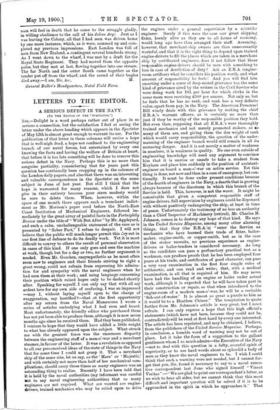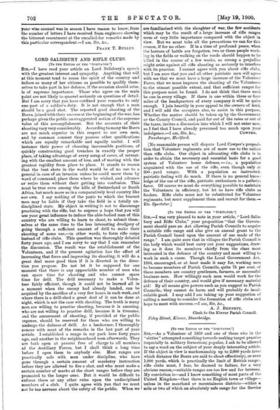LETTERS TO THE EDITOR. A SERIOUS DEFECT IN THE NAVY.
[TO THE EDITOR OP THE "SPECTATOR.")
Sin,—Delight is a word perhaps rather out of place in so serious a connection, but the satisfaction I feel at seeing the letter under the above heading which appears in the Spectator of May 12th is almost great enough to warrant its use. For the publication of that letter in these columns will revive a hope that is well-nigh dead, a hope not confined to the engineering branch of our naval forces, but entertained by every one larorVing the facts and having the welfare of Britain at heart, that before it is too late something will be done to remove this serious defect in the Navy. Perhaps this is no more than sanguine partiality, remembering that for years past this question has continually been cropping up in the columns of the London daily papers, and also that there was an interesting and valuable correspondence in the Spectator on the same subject in June of last year. But still I think that the hope is warranted for many reasons, which I dare not give in their entirety because your stern modesty would be sure to delete them. When, however, within the space of one month there appears such a trenchant indict- ment as Mr. Morison's paper read before the North-East Coast Institution of Mechanical Engineers, followed im- mediately by the great array of painful facts in the Fortnightly Review under the title of "With But ter" by Mr. Appleyard, and such a calm, unchallengeable statement of the case as is presented by "Sober Fact," I refuse to despair. I will not believe that the public will much longer permit this try-rot in our first line of defence to do its deadly work. Yet it is most difficult to convey to others the result of personal observation in cases of this kind. If one only goes and sees the machine at work, though but for a day or two, no further argument is needed. Even Mr. Goschen, unsympathetic as he must often seem now to engineers and their friends striving to right a great wrong, could not refrain from expressing his admira- tion for and sympathy with the naval engineers when he had seen them at their work; and using language concerning their position which raised hopes only to be dashed shortly after. Speaking for myself, I can only say that with all my ardent love for my own side of seafaring, I was so impressed —may I, without laying myself open to the charge of exaggeration, say horrified ?—that at the first opportunity after my return from the Naval Manceuvres I wrote a series of articles embodying what I had seen and heard. Most unfortunately, the friendly editor who purchased them has not yet been able to produce them, although it is now seven months ago since he received them. Had they been published, I venture to hope that they would have added a little weight t> what has already appeared upon the subject. What struck me with the greatest force was the enormous disparity between the engineering staff of a man-o'-war and a merchant steamer, in favour of the latter. It was a revelation so opposed to all our preconceived ideas of the state of things in the Navy that for some time I could not grasp it. That a merchant ship of the same size, let us say, as the 'Mars' or 'Majestic,' and with certainly not more than half of her mechanical com- plications, should carry three times as many engineers was an astounding thing to realise. Recently I have been told that it is held by the naval authorities (my informant was careful sot to say naval engineering authorities) that so many engineers are not required. What are wanted are engine- drivers, trained mechanics who may be relied upon to drive the engines under a general supervision by a scientific engineer. Surely if this were the case our great shipping firms, keenly alive as they are to all forms of economy, would long ago have thus arranged their staff. Assuming. however, that merchant-ship owners are thus unnecessarily wasteful, and that it is the right thing to depend upon trained engine-drivers to fill the places which are taken in a merchant ship by certificated engineers, does it not follow that these responsible engine-drivers should be men with something to lose in case of dereliction of duty? Ask an E.R.A. (engine- room artificer) what he considers his position worth, and what amount of responsibility he feels! And you will find him smarting under a sense of deep-seated grievance too, the same kind of grievance aired by the writers in the Civil Service who were doing work for 10d. per hour for which clerks in the same room were receiving E500 per annum. Not only so, but be feels that he has no rank, and rank has a very definite value, apart from pay, in the Navy. The American Personnel Bill wisely deals with this grievance by making the chief E.R.A.'s warrant officers, as is certainly no more than just if they be worthy of the responsible position they hold. But even then, supposing that all E.R.A.'s were thoroughly trained mechanics and not merely promoted stokers. as so many of them are, and giving them the due weight of rank which would carry responsibility, the question of the under- manning of the engineer branch would still remain in all its menacing danger. And it is not merely a matter of weakness in numbers, it is weakness in quality. No one even outside of engineering knowledge will need any argument to convince him that it is unwise or unsafe to take a student from Keyham and place him suddenly in the position of assistant- engineer on board a man-o'-war on active service. Yet this thing is done, not now and then in a ease of emergency, but con- tinually. It must be done under present conditions because of the dearth of engineers in the Navy, a dearth that is growing always because of the disesteem in which this branch of the Service is held. This, however, is not the worst. It might be conceivable that given a competent responsible staff of engine-drivers, full supervision by engineers could be dispensed with without positively endangering the ship, at least in time of peace. Unfortunately the testimony of no less an authority than a Chief Inspector of Machinery (retired), Mr. Charles M. Johnson, comes in to destroy any hope of that kind. He says in the United Service Magazine, among many other alarming things, that they (the E.R.A.'s) "enter the Service as mechanics who have learned their trade of fitter, boiler- maker, engine-smith, or copper-smith, but as in the case of the stoker recruits, no previous experience as engine- drivers or boiler-tenders is considered necessary. As long as the candidate can pass a perfunctory practical test as a workman, can produce proofs that he has been employed four years at his trade, and certificates of good character, can pass a very easy examination in the first four simple rules of arithmetic, and can read and write; that, . with a medical examination, is all that is required of him. He may never have had the handling of an engine or boiler under actual work, although it is expected that he will have taken part in their construction or repair, so that when introduced to the engine-room of a modern man-o'-war, he will be a veritable fish-out-of-water.' It is almost as great a puzzle to him as it would be to a Heathen Chinee." The temptation to quote farther from Mr. Johnson's article is very great, but I must refrain. I can only express a hope that this high official's statements (which have not been, because they could not be, contradicted) will be read at first hand by every one interested. The article has been reprinted, and may be obtained, I believe, from the publishers of the United Service Magazine. Perhaps, in conclusion, a humble word of warning may not be out of place. Let it take the form of a suggestion to the gallant gentlemen whom I so much admire—the Executive of the Navy .—not to deal with this question in a lofty, scornful spirit of superiority, or to use hard words about so splendid a body of men as they know the naval engineers to be. I wish I could think that such a warning were not needed, but I cannot for- get that you, Sir, found it necessary to say to a naval execu- tive correspondent last June who signed himself " Vincet Veritas " :—" We are glad to print our correspondent's letter, as we wish to hear all sides, but we cannot think that this most difficult and important question will be solved if it is to be approached in the spirit in which he approaches it." That
your wise counsel was in season I have reason to know, from the number of letters I have received from engineers showing the bitterest resentment at the uncalled-for remarks made by this particular correspondent. —I am, Sir, &c., FRANK T. BULLEN.







































 Previous page
Previous page